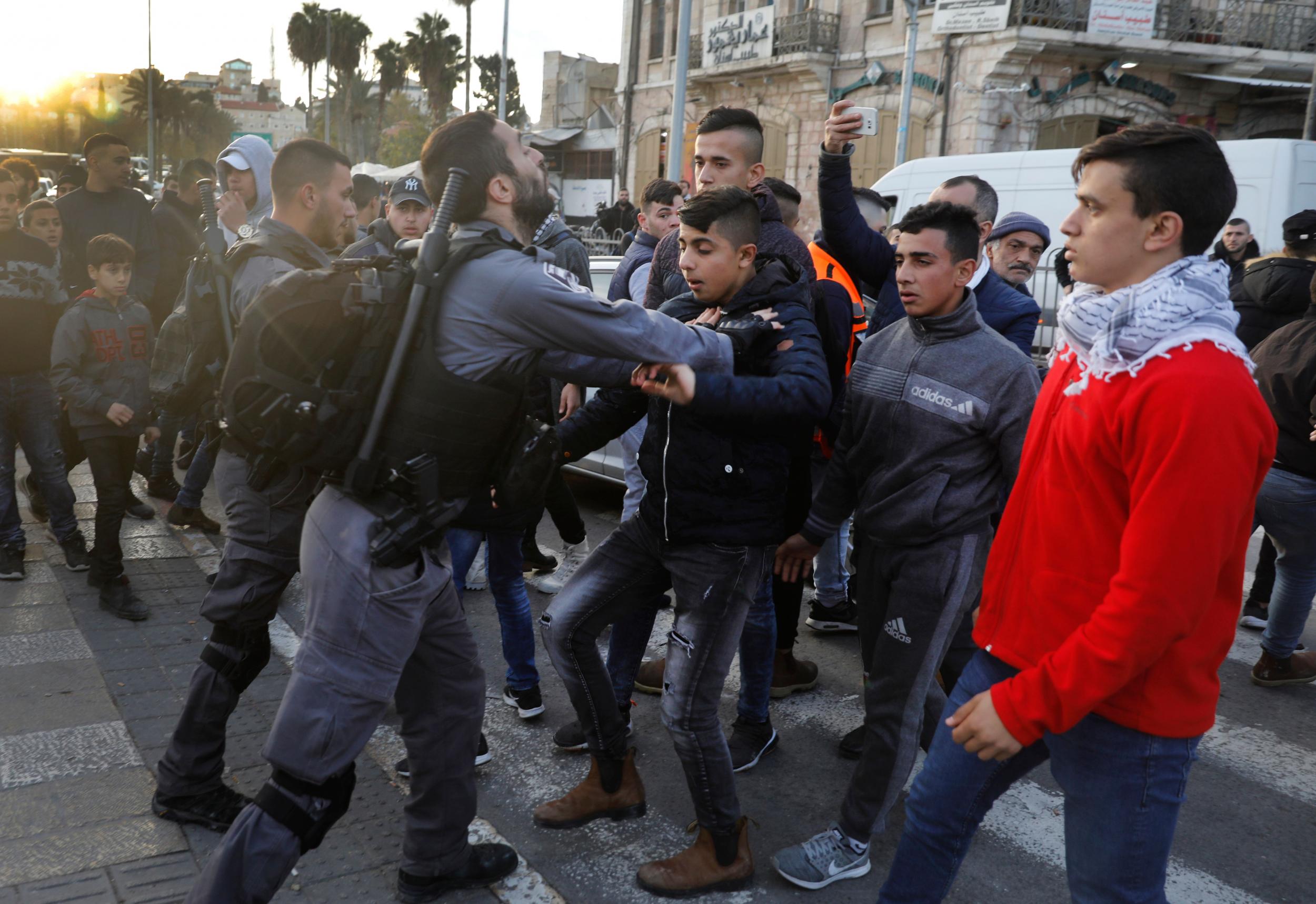Intifada: What is it and and what would a third Palestinian uprising mean for Israel and the Middle East?
Palestinians and Israelis alike are bracing themselves for Hamas’ declared ‘Day of Rage’ on Friday - but it's too early to tell whether the anger will spark a new intifada

Following Donald Trump’s decision to recognise the contested city of Jerusalem as the capital of Israel, Hamas’ leader has called on the Palestinian people to rise up in a new intifada.
“We should call for and we should work on launching an intifada in the face of the Zionist enemy,” Ismail Haniyeh said in a speech from Gaza on Thursday.
“This will not stop until the liberation of Jerusalem and the West Bank,” he added.

The statement comes amid worldwide outrage over the US’ decision to move their embassy to Jerusalem from Tel Aviv and recognise the city as the capital of the Jewish state.
Israel annexed east Jerusalem in the 1967 Six Day war, a move that was never internationally recognised.
Israelis claim the entire city as their capital - as do Palestinians. Control of it remains one of the major stumbling blocks in any Israeli-Palestinian peace deal.
Palestinian and Israeli civilians and the Israeli armed forces alike are bracing themselves for Hamas’ declared ‘Day of Rage’ on Friday.
More protests and strikes are expected - and the Muslim holy day is often a test for whether such demonstrations turn violent.
What does 'intifada' mean?
Intifada is an Arabic word that translates literally as ‘shaking off’. It has been used to refer to legitimate means of resistance against oppression across the Middle East for decades.
In the Arab-Israeli conflict, it means a concerted Palestinian effort to shake off Israeli power and gain independence. The movements employ various forms of violence.
An intifada cannot be called or commanded by Palestinian leaders. While both Fatah and Hamas have encouraged such movements in the past, the previous two uprisings grew out of grassroots mass support of Palestinians of all walks of life.
When was the first Palestinian intifada?
The first intifada broke out in 1987 after four young Palestinians were killed by Israeli soldiers at a checkpoint in Gaza and the shooting of a 17-year-old boy during an unarmed protest.
The uprising was for the most part made up of unarmed Palestinians. It was known as the ‘war of stones’ because of images of young men throwing rocks at Israeli soldiers.
It ended in 1993 with the signing of the Oslo accords which established the Palestinian Authority ruling body and Israeli withdrawals from West Bank.
And the second?
The second intifada lasted began in 2000 and was known as the ‘al Aqsa intifada’.
It was sparked by former Israeli Prime Minister Ariel Sharon’s visit to the al-Aqsa mosque complex, known as the Temple Mount in Judaism.
Access to the Temple Mount site has always been a hugely contentious issue. While it is located in East Jerusalem, which was annexed by Israel in 1967, the Muslim-administered site is operated by neighbouring Jordan in order to avoid conflict.
Hamas, which had grown by then into a well-armed movement, led the charge - including suicide bombings and other sophisticated terror attacks aimed at civilians.
It fizzled out in 2003-2004 with the death of the former chair of the Palestinian Liberation Organisation (PLO), Yasser Arafat, and left people on both sides sceptical of successful peace talks.
Hasn’t the violence in Jerusalem in recent years been referred to as the third intifada?
Jerusalem has seen an upswing in stabbings and shooting attacks in the last three years in what has been dubbed the ‘Jerusalem’ or ‘silent intifada.
The unrest has largely been attributed to the breakdown of the 2013-2014 peace talks, the increased rate of Israeli settlement building in the occupied West Bank, and a lack of economic opportunity for Palestinian youth.
In July this year there were intense clashes over access to al-Aqsa after the Israeli authorities installed security cameras, x ray machines and other security measures in what was viewed as an attempt to control the site.
What could a third intifada mean for the region?
Both previous intifadas eventually affected proved to be political turning points in the conflict as Israeli forces struggled to deal with the scale of the uprisings.
While much has been made in the last few days of Mr Trump’s decision “killing” the peace process, talks between the two sides have in reality been dormant for years.
There have been small clashes and protests across West Bank cities on Thursday and both sides are bracing themselves for Friday.
The Muslim holy day is often a flashpoint where protests morph into violence but it is too early to tell yet whether the Palestinians will take up Hamas’ call and launch a full-blown intifada.
Join our commenting forum
Join thought-provoking conversations, follow other Independent readers and see their replies
Comments
Bookmark popover
Removed from bookmarks